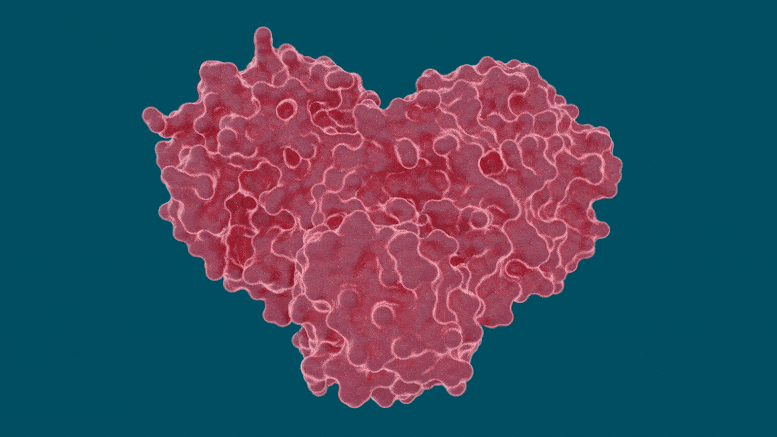The heart-shaped SARS-CoV-2 major protease enables the virus to reproduce by cutting long protein chains that activate the replication process. Experiments show that existing drugs used to treat hepatitis C may be able to treat COVID-19 by stopping the “heart” of the virus. Photo credit: Michelle Lehman, Jill Hemman / ORNL, US Department of Energy
Experiments by researchers at the Department of Energy’s Oak Ridge National Laboratory have shown that several hepatitis C drugs can inhibit the disease SARS-CoV-2 Major protease, a crucial protein enzyme that enables the new coronavirus to reproduce.
Inhibiting or blocking the function of this protease is critical to preventing the virus from spreading in patients with COVID-19. The study published in the journal structureis part of an effort to rapidly develop pharmaceutical treatments for COVID-19 by reusing existing drugs that are known to be effective in treating other viral diseases.
“There are currently no Food and Drug Administration-approved inhibitors that target the SARS-CoV-2 major protease,” said ORNL lead author Daniel Kneller. “We have found that hepatitis C drugs bind to the coronavirus protease and inhibit it. This is an important first step in determining whether these drugs should be viewed as potential candidates for the treatment of COVID-19. ”

The heart-shaped SARS-CoV-2 major protease enables the virus to reproduce by cutting long protein chains that activate the replication process. Experiments show that existing drugs used to treat hepatitis C may be able to treat COVID-19 by stopping the “heart” of the virus. Photo credit: Michelle Lehman, Jill Hemman / ORNL, US Department of Energy
The SARS-CoV-2 coronavirus spreads by expressing long chains of polyproteins that must be cut by the major protease in order to become functional proteins. This makes the protease an important drug target for researchers and drug developers.
In the study, the team looked at several well-known drug molecules for potential conversion efforts, including leupeptin, a naturally occurring protease inhibitor, and three FDA-approved hepatitis C protease inhibitors: telaprevir, narlaprevir, and boceprevir.
The team took x-ray measurements at room temperature to create a three-dimensional map that showed how the atoms were arranged and where chemical bonds were formed between the protease and drug inhibitor molecules.
The experiments showed promising results for certain hepatitis C drugs in terms of their ability to bind and inhibit the major SARS-CoV-2 protease – particularly boceprevir and narlaprevir. Leupeptin showed low binding affinity and was excluded as a viable candidate.
To better understand how well or how tightly the inhibitors bind to the protease, they used in vitro Enzyme kinetics, a technique that allows researchers to examine the protease and inhibitor in a test tube to measure the binding affinity or compatibility of the inhibitor with the protease. The higher the binding affinity, the more effectively the inhibitor blocks the function of the protease.
“We are laying the molecular foundation for these potential drug reuse inhibitors by disclosing how they work,” said ORNL correspondent Andrey Kovalevsky. “We show at the molecular level how they bind, where they bind and what they do with the enzyme form. And with in vitro Kinetics we also know how well they bind. With every piece of information we get one step closer to knowing how to stop the virus. ”
The study also highlights a particular behavior in the protease’s ability to change or adapt its shape according to the size and structure of the inhibitor molecule to which it binds. Pockets within the protease to which a drug molecule would attach are highly malleable or flexible and can either open or close to some degree depending on the size of the drug molecules.
Before the paper was published, the researchers made their data publicly available to inform and assist the scientific and medical community. More research, including clinical trials, is needed to validate the drugs’ effectiveness and safety as a COVID-19 treatment.
“Research suggests that hepatitis C inhibitors should be considered as potential reuse candidates. By publishing our data immediately, science will be able to study the interactions between these inhibitors and the protease, ”said ORNL correspondent Leighton Coates. “You can’t develop a drug without knowing how it works at the molecular level, and the data we provide is exactly what developers need to create stronger, tighter binding drugs for more effective treatments.”
The X-ray measurements and the synthesis of the protease samples used in the experiments were carried out with the support of the Center for Structural and Molecular Biology using facilities at the spallation neutron source.
The research team is planning neutron scattering experiments to localize the hydrogen atom Positions and the network of chemical bonds between the protease and the inhibitor molecules.
Reference: “Formability of the SARS-CoV-2 3CL Mpro Cavity in the Active Center Facilitates the Binding of Clinical Antivirals” by Daniel W. Kneller, Stephanie Galanie, Gwyndalyn Phillips, Hugh M. O’Neill, Leighton Coates and Andrey Kovalevsky, 23. October 2020, structure.
DOI: 10.1016 / j.str.2020.10.007
The paper’s co-authors also include Stephanie Galanie, Gwyndalyn Phillips, and Hugh M. O’Neill.
COVID-19 research at the ORNL is supported in part by the DOE Office of Science through the National Virtual Biotechnology Laboratory, a consortium of national DOE laboratories focused on responding to COVID-19 and funded with funds from the Coronavirus CARES Act .
SNS is a user facility of the DOE Office of Science.

